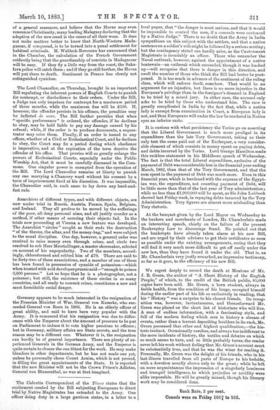The Calcutta Correspondent of the Times states that the excitement
created by the Bill subjecting Europeans to direct trial by Native Magistrates has extended to the Army. One officer doing duty in a large garrison states, in a letter to a local paper, that "the danger is most serious, and that it would be impossible to control the men, if a comrade were sentenced by a Native Judge." There is no doubt that the Army in India sympathises on this subject with the settlers, and that a native sentence on a soldier's wife might be followed by a serious mutiny; but the contingency stated can hardly arise, as the Cantonment Magistrate is invariably an officer. Those who remember the Naval outbreak, however, against the appointment of a native boatswain—an outbreak which succeeded, though it was hushed up—will recognise that there is danger in this direction, and swell the number of those who think the Bill had better be post- poned. It is too much in advance of the sentiment of the ruling class, which will enforce itself, somehow. That would be no argument for an injustice, but there is no more injustice in the European's privilege than in the foreigner's demand in England to be tried by a mixed jury. In either case, the accused only asks to be tried by those who understand him. The case is greatly complicated in India by the fact that, while a native lady is exempt from examination in Court, a European lady is not, and thus Europeans will under the law he rendered in Native eyes an inferior caste.


































 Previous page
Previous page